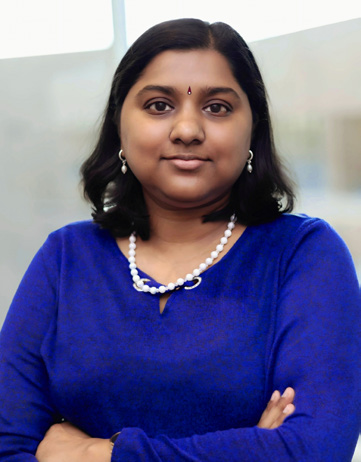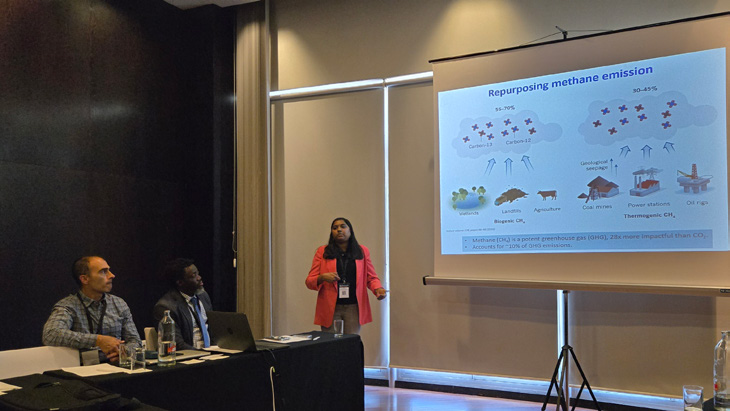News from the MCAA - From thatched classrooms to sustainable chemistry labs: Turning methane into clean chemicals - September 2025
Newsletter

Bionote
Manila Ozhukil Valappil is a Marie Skłodowska-Curie Actions Postdoctoral Researcher at ICN2, Spain, developing electrochemical approaches to convert methane into fuels and chemicals. Her research spans sustainable electrochemical energy conversion and storage, as well as 2D materials. She holds a PhD in Chemistry from CSIR-Central Electrochemical Research Institute, India, and is a recipient of the Newton Bhabha Fellowship (British Council). She has carried out postdoctoral research in Canada and has authored over 20 peer- reviewed publications. Manila is a member of the Royal Society of Chemistry, an IUPAC affiliate, an RSC MentorLoop mentor, and actively contributes as a journal reviewer and science communicator.
From a village school in India to shaping sustainable chemistry in Europe, this Marie Skłodowska-Curie Fellow’s journey shows how resilience, curiosity, and a passion for sustainability can open doors and redefine who belongs in science.
I never imagined that science would take me this far, not just across borders but through transformative ideas that reshaped how I see myself, both in science and in the world. My classrooms were thatched huts in a rural Indian village. We saw lab coats, glassware, and coloured solutions only in textbooks. Fast forward to today, I am doing research in a European laboratory as a Marie Skłodowska- Curie Actions (MSCA) Postdoctoral Fellow, based at ICN2 Barcelona, investigating how to valorise methane, a potent greenhouse gas, into clean fuels and chemicals. This journey is not just about tricking molecules, but also about my way of finding meaning in science.
Turning methane into opportunity
Methane is often treated as a harmful greenhouse gas, either burned off or overlooked when produced as a by-product of biogenic processes, despite being roughly 28 times more potent in driving global warming than carbon dioxide. While we worry about fossil fuel emissions, the carbon footprint of commodity chemicals such as paints, plastics, and pharmaceuticals often goes unexamined.
My MSCA project is therefore about considering methane not as a problem, but as a resource that can be repurposed to produce these useful chemicals otherwise made through energy-intensive, high- carbon footprint processes. Leveraging electrochemistry and renewable energy, I am developing mild, energy-efficient pathways to convert this hard-to-break molecule into methanol, to decarbonise its industrial production. It’s not just a scientific question to solve, but an opportunity to build more sustainable chemistries for the future.

Left: The village school, AUPS Malamakkavu, State of Kerala, India, where my journey started. Roofs have changed, but the roots remain. Right: Quiet village landscape, just a short walk from home, with farmers working in paddy fields.

Speaking to a non-specialist audience at an interdisciplinary conference on sustainable transportation in Granada, Spain, on how electrochemical methane conversion fits into the broader picture of sustainability
Roots and research journey
Rewinding a little to where it all started, I come from a caste-oppressed background and an under-resourced public education system. Access to science was limited and rarely personalised. My parents worked hard, feeding cattle and doing manual labour. They didn’t know that careers in scientific research even existed or were within reach. Regardless, they trusted the value of education and did everything they could to provide it. As I didn’t have the luxury of having anyone to guide me, I simply followed what was most affordable, doing what everyone else around me was doing, unaware of other possibilities within reach. It was during my master's that I realised I enjoyed doing electrochemistry, a turning point that clarified my research direction. From there, things started to shift. I secured a PhD position at CSIR- Electrochemical Research Institute, India.
Since then, my research journey has taken me across continents, from a PhD in India to the UK for an exchange, and then five postdoctoral years in Canada working on sustainable chemistries, before landing in Spain for the MSCA fellowship. Each move brought new mentors, collaborators, lab cultures, and perspectives, all connected by one goal: to build a better world. Along the way, I realised that what is often lauded as merit in science is often shaped by unseen advantages, whether it be access to quality schools, mentors, computers and the internet, language skills, or academic networks. These gaps don’t just disappear, meaning that people like me discover and enter research much later. That delay makes it difficult to build confidence and forces many of us to learn foundational aspects later, often while already navigating a demanding environment. For some, entering science is a natural progression. For others like me, it begins with finding a way in and picking up fast to stay on track. These realisations didn’t let me down, though. They defined my purpose. The values I grew up with shaped my deeper perspective on why inclusion, teaching, and training others are important, whether offering constructive feedback on a thesis, providing assistance in the lab, or simply listening when someone is struggling with personal challenges.
Beyond the lab
I have found joy in more than just experiments. Mentoring students, reviewing scientific papers, and guiding junior researchers feels as meaningful as research itself. I give talks at interdisciplinary conferences and return to colleges and schools in my hometown, especially places that remind me of where it started. Today, other women in my family are also pursuing science, once unimaginable. Many people in my village have now heard about the MSCA grant for the first time. It has sparked curiosity and a sense of pride in their little world that once seemed distant and unreachable. This MSCA fellowship has therefore been more than just a research grant. It has served as a foundation for growth, reflection, and action. Through my research, I aim to help develop cleaner technologies for a sustainable future. Through my space, I also hope to defy narrow ideas of who belongs in science. That, I believe, might be the most meaningful outcome of all.
Manila Ozhukil Valappil
Orcid
LinkedIn
X
Bluesky
Catalan Institute of Nanoscience and Nanotechnology (ICN2), Barcelona
manila.ozhukil@icn2.cat